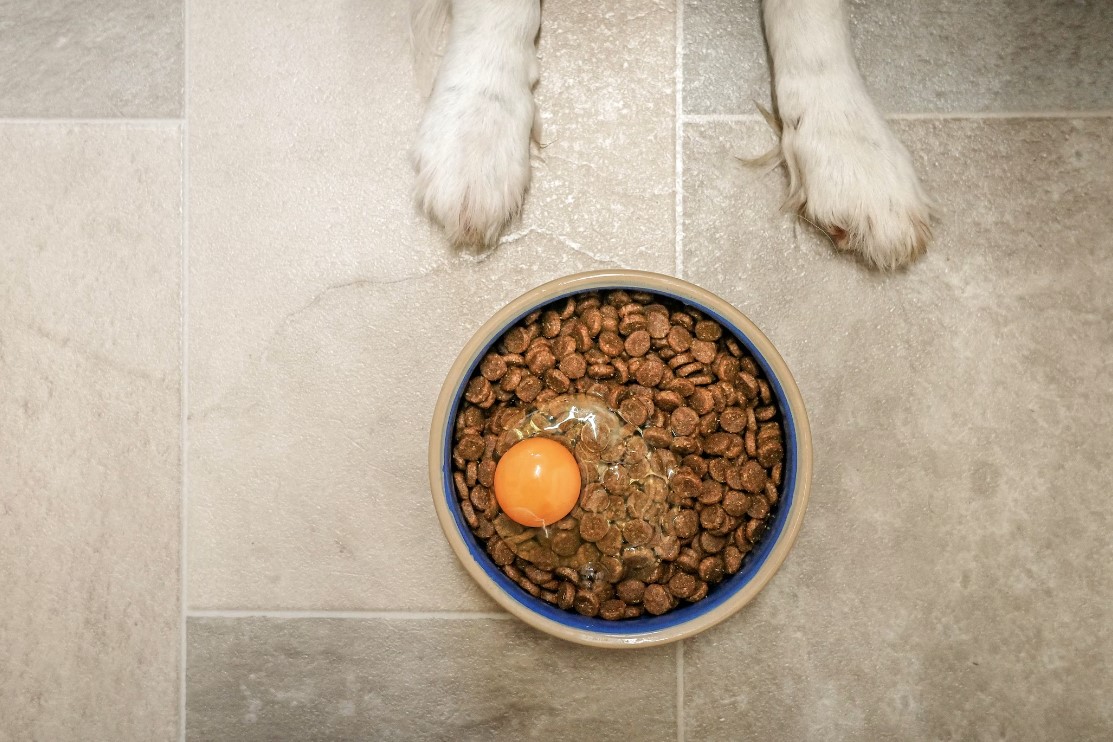
Like with most nutritious superfoods you’ll hear many misconceptions convincing you not to feed your dog raw eggs, and how you must feed them processed nuggets of cereal grain for the sake of their health.
Your veterinarian or nameless Internet self-taught canine nutrition expert may parrot the following:
- Salmonella risk!
- Biotin deficiency!
- Allergic reactions!
- Digestive upset!
- All real foods will make your dog sick!
Let’s consider these problems pragmatically, as raw eggs are not without obvious risk, but lets start with the benefits of the trusty egg, a benchmark in digestible proteins, designed by nature to grow life:
BACKSTORY: Do wild carnivores eat eggs?
I’m not your Grandma, and I don’t want to teach you how to suck eggs, but it’s worth considering the natural world before we consider the dietary needs of our domestic dogs (and carnivorous cats).
We already know wild carnivores eat eggs. Of course they do.
In fact, most wild carnivores would never pass up the opportunity to devour a raw egg.
The reason for this, is instinct.
Predatory carnivores like foxes, wolves, and birds of prey like eagles and owls, actively raid nests for eggs as part of their natural foraging behaviour. Eggs from ground dwelling birds and Emus are often on the menu for dingoes.
For these wild carnivores, eggs are a valuable, energy-rich, and nutrient-rich supplement to their diet.
Nature knows best, right?
Why are eggs excellent?
I really struggled to not say “eggscellent” with that title. My Dad always jokes “Do as I say, not as I do”, so I gritted my teeth and shelled that pun.
Eggs are one of the healthiest foods on the Earth.
Not only do eggs pack a complete-amino-acid punch (amino acids are the building blocks for protein), they’re rich in nutrients, high in healthy fats, with only 0.6 grams of carbohydrate per egg.
Other than the risks posed by salmonella or reactions from microbiome-disrupted dogs, it’s hard to find an argument against feeding your dog raw eggs.
My dog, and my cat, have benefitted from raw eggs for many years, and you know what – not once has there been an issue. At age 13 my cat Bernard still displays wonderful health and activity levels, which is in stark contrast to many cats of his age struggling through renal difficulties and struvite crystals.
Addressing the concerns of raw eggs for dogs
High cholesterol, I hear you say?
In my younger years I was told eggs led to high cholesterol, and high cholesterol was bad.
As an interesting side-note, from a conversation I had the other day with someone from Poland, they had never heard of this concern. It would seem anti-egg propaganda is region specific?
The cholesterol concern, if you still want to call it a concern, is in relation to the yolk. However, the yolk also happens to be the richest source of nutrients.
Salmonella
Salmonella is a real risk. As with raw meat, you already know all too well we should use precautions. That’s why we don’t eat off the same plate we’ve chopped up raw chicken, and we wash our hands during and after food preparation.
Thankfully for our dogs and cats, they’re very tolerant of bacteria in their food, including salmonella. Their digestive system is shorter and more acidic than ours, and this helps kill off harmful bacteria.
A dog will be more susceptible to harmful bacteria if their immune system is compromised, they’re a developing puppy, or an elderly dog.
If your dog displays symptoms of salmonella exposure, such as diarrhea, vomiting, lethargy, or loss of appetite, then address the issue with your vet immediately.
Biotin deficiency
The risk of biotin deficiency comes with an easy solution, and that’s to feed eggs in moderation and never in excess.
This rule of thumb can be used for many types of food. Feeding your dog a diet of mostly beef mince will lead to deficiencies. The same can be said for feeding a poor quality cereal-based kibble. Variety and balance are key, which is why we wouldn’t feed our dogs eggs morning, noon, and night.
Egg whites contain a glycoprotein avidin, and this can bind with biotin in your dog’s digestive system. The reason that isn’t good is because biotin (aka vitamin B7 or vitamin H) plays a crucial role in numerous bodily functions – metabolism of fat, carbs, and proteins, and to help maintain skin and coat health.
That’s one reason not to feed raw eggs in excess, which you weren’t planning to do anyway.
Allergies and digestive issues
Some dogs react to eggs.
Some dogs react to pretty much anything, especially if their gut has been disrupted from ill health, antibiotics, or they were weaned on chook feed (or poor quality kibble) as a puppy. Once a dog’s gut is in a mess they start reacting to various foods, with symptoms of itchy skin, hot spots, or diarrhea.
These reactions are often termed “allergies”, but in reality they’re dietary “sensitivities”.
If your dog suffers sensitivities such as this, and they react to raw eggs, then you could try boiled eggs. Quite often a dog will react to a raw form of eggs or meat, but not cooked. Sometimes we find the opposite effect, where a dog will only react to those foods cooked.
Should you feed your dog raw eggs?
As we’ve discussed above, eggs are a wonderfully nutritious natural food.
Eggs are also filling, and a very affordable way to give our dogs a treat.
I feed my pets raw eggs. Do you?






